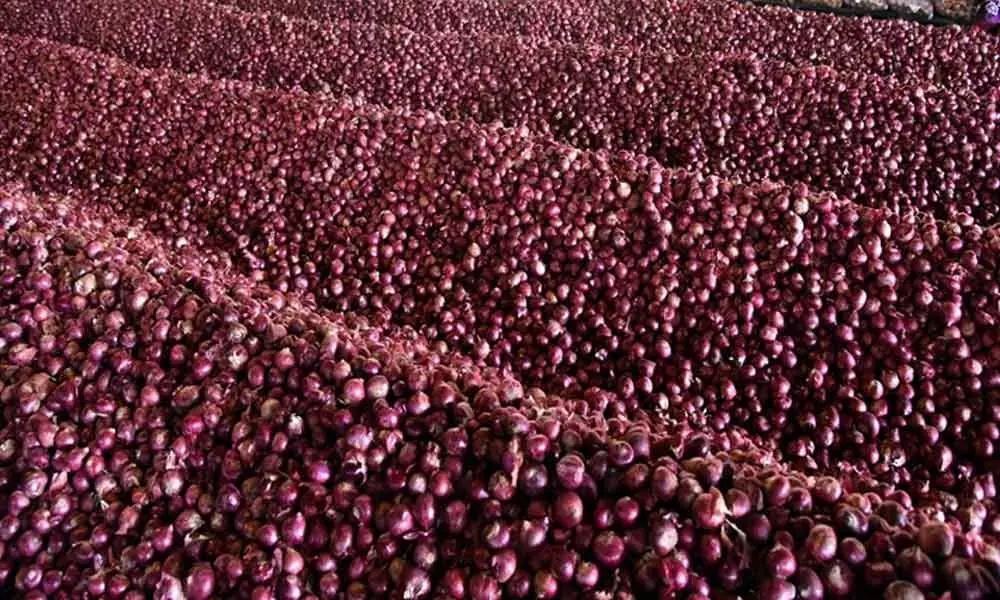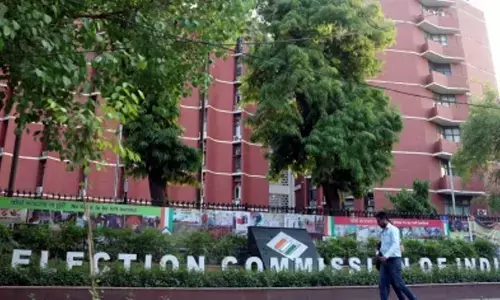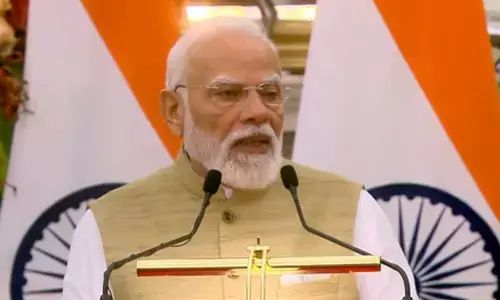Centre bans export of onions

In a nation-wide crackdown on hoarders of onions, the Union government on Sunday put stock limits on traders and banned its exports with immediate effect in order to increase domestic supply and bring down the sustained high prices of the politically sensitive vegetable ahead of key state elections in Haryana and Maharashtra.
New Delhi: In a nation-wide crackdown on hoarders of onions, the Union government on Sunday put stock limits on traders and banned its exports with immediate effect in order to increase domestic supply and bring down the sustained high prices of the politically sensitive vegetable ahead of key state elections in Haryana and Maharashtra.
Retail prices of the key cooking ingredient have shot up to 60-80 per kg in Delhi due to supply disruptions after floods in some states. A similar price trend prevails in other parts of the country.
Acting swiftly on a letter from consumer affairs secretary A K Srivastava earlier on Sunday to DGFT A K Chaturvedi, the Commerce ministry issued a notification banning exports of onions.
Srivastava had written to Chaturvedi that despite the Sept 13 order of imposing minimum export price cap of $850 per tonne, export of onions continues unabated.
"With a view to improve domestic availability and control prices, may I request you to consider banning export of onions immediately," Srivastava wrote. Later in the day through a notification, DGFT put onion exports in prohibited list from the list of items which can be exported freely.
"The reported export below minimum export price to Bangladesh and Sri Lanka will be immediately stopped and strict action will be initiated against those who are found to be violating this decision of the government," a government official said speaking under condition of anonymity.
India's onion exports declined 10.7% to $154.5 million during April-July period this year compared to the same period a year ago. Malaysia, Bangladesh, Sri Lanka and Unite Arab Emirates were the top importers of onion from India during this period.
Simultaneous, the consumer affairs ministry also imposed stock limits on onion traders to facilitate release of stocks in the market and prevent hoarding by traders. For retail traders, the stock limit is 100 quintal and for wholesale traders the stock limit is at 500 quintals.
"Till now the state governments have been implementing the stock limit as per the circumstances. For the first time, the centre has simultaneously imposed stock limits across the country.
At the same time, the state governments have been directed to take strict action against hoarders. Soon, onion prices will come down in the market," Food and consumer affairs minister Ram Vilas Paswan tweeted.
Paswan last week said the Centre will not hesitate to impose stock limits on onion traders if its retail price does not soften considerably.
The Centre has a buffer of about 56,700 tonnes of onion built through NAFED (National Agricultural Cooperative Marketing Federation of India Ltd) which is being utilized for supplies to Delhi at a rate of 23.90 per kilogram.
Haryana and Andhra Pradesh are also being supplied from the buffer. Other states have also been asked to utilize this buffer and indicate their demand for the same to either NAFED or Department of Consumer Affairs.
Devinder Sharma, a food and trade policy analyst, wondered why the government does not swing into action when prices dip to 1 or 2 or farmers are throwing produces on the street.
"What happens to the government then? Is government's concern only confined to the consumers and not producers? This ad-hocism in import-export policy is killing our agriculture," he added.
Onion crop is grown thrice a year: rabi (March-June), kharif (October-December) and late kharif (January-March). The rabi crop, harvested between April and June, accounts for 60-65% of the annual production and sustains consumers till October-November. Maharashtra and Karnataka together account for more than half of the country's onion production.
A detailed study by Bengaluru-based Institute for Social and Economic Change for the Competition Commission of India (CCI), which had on its own decided to investigate cartelization in onion prices, reveals an unholy nexus among a clutch of traders.
The report, submitted in 2012, drawing from secondary data and a primary survey of mandis in Maharashtra and Karnataka, concluded that not only was there a lack of competition in onion trading, there were also entry barriers—according to it, with most of the gains accruing to traders. According to the study, one individual accounted for as much as a fifth of the trade.









